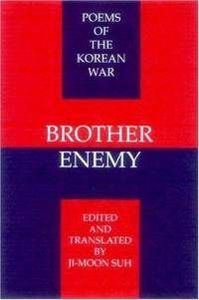Twenty-one poets, male and female, North Korean and South Korean, well-known and long forgotten, appear in this collection, the first of its kind in English. The poems reflect the reality of living in a country torn in half by political ideologies. An introduction by translator Ji-moon Suh places the poems and the poets within a historical context that describes the suffering and despair of pitting brother against brother.
Poems translated from Korean.
From Booklist
The family historically has been the most important institution in ordinary Koreans' lives. But if brothers happened to be on either side of the north-south line dividing Korea when the 1950-53 war began, they were conscripted by opposing armies. That horrified Koreans' souls, and the horror of forced familial, not just civil, war resounds in these poems by literary men, soldiers, and South Korean president Syngman Rhee. Only one Communist sympathizer's work appears, that of North Korean army medic Yu Ch'un-do, yet since people on both sides held all Korea dear, southerners' poems deeply sympathize with northerners. Great appreciation and some anger are voiced for the European and American troops who abetted the south. The greatest rancor is directed at the Communists as Communists, though a few poems recall Japan's brutal 1910-45 occupation or express bitterness at being pawns of America and Russia. Sturdily translated, well if too meagerly annotated (religious allusions and prosodic matters go unexplained), this is war verse as compelling as any, regardless of time or place. Ray Olson
Copyright © American Library Association. All rights reserved
